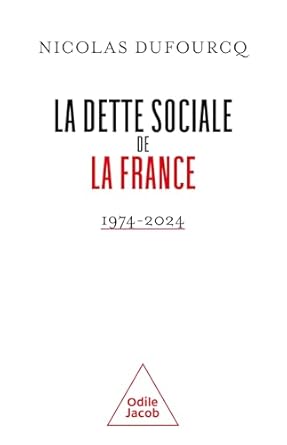In keeping with what has now become a well-established habit, Nicolas DUFOURCQ lays down truths about the French economy that are objectified by a large number of statistics and his own analyses, and “justified” in the second part of the book by testimonials and interviews. His conclusion is as follows: “The family secret of French society is not debt. Everyone knows it exists. But it is social debt. Two-thirds of French public debt finances social benefits. It is consumer credit, not an investment in the future. It pays the monthly bills of millions of our fellow citizens.”
This “flaw” in the French economy is not new, but rather the result of a slow decline spanning 11 periods since 1969, from the era of “new rights and heavy taxation” to the “misfortunes of COVID,” via “the beginnings of the strong franc,” “markets turning to the left,” the “financial crisis” of 2007-2012, and two “missed opportunities” in 1988-1993 and 1997-2002.
It should be noted that these responsibilities are not specifically linked to right-wing or left-wing programs as such, but rather to a series of concessions and misguided ambitions. However, it seems that there have been many decisions that went against the grain: the introduction of numerous rights during the first oil crisis, the 35-hour working week during the global recovery in 1997 and China’s active entry into world trade, and the “bad luck” of the 2007 crisis and COVID in 2020. Bad luck or insufficient preparation by the country for endogenous resilience in the face of global turmoil. It was then necessary to rely “on others,” a European plan, “quasi-guaranteed” support from the ECB, a recovery in Germany since 2024, all signs of France’s loss of control over its destiny! And the current debate in Parliament is focused on a quarter of a year of retirement and taxation. The nature of social debt addiction is linked to the fact that “the state failed to protect its citizens in 1939-45” and that the National Council of the Resistance decided to “correct” this mistake…ad vitam, regardless of developments in the world.
This led to the perpetuation of a fiction whereby, on the one hand, there was Social Security with contributions considered as insurance premiums, and on the other, what was called “welfare.” Except that, at the same time, the state created “new forms of solidarity and a continent of social rights, unrelated to work,” with transfers in all directions, leading to 58% of public spending being social in nature. Thus, “the social horse gallops ahead of the economic horse because it is doped with the white powder of debt.”
A few quotes illustrate the point. “The social partners will not hesitate to systematically increase social security contributions, leading to a rise in labor costs that will herald the mass unemployment of the 1980s and 1990s.” “Raymond Barre himself did not believe it was possible to reduce compulsory levies.” “It can be said that today, part of the €80 billion in social security relief in the state budget compensates for the decisions to increase contributions taken in the 1970s by Raymond Barre.”
All are responsible, but none are guilty; yet without awareness of responsibilities, no systemic solution can be validly conceived, let alone implemented.
A welfare state requires a mature democracy, and ours has not been one. We are paying for our slowness and delays. We must assert the right of tomorrow’s French citizens not to be burdened with repaying their grandparents’ consumer debt. “According to the author, minds are ripe for an iron rule” and “if there is no other way than to impose a rule of balance on social spending, then we will have to propose to the French people that it be imposed by decree the day after a presidential election.”
Dominique CHESNEAU


